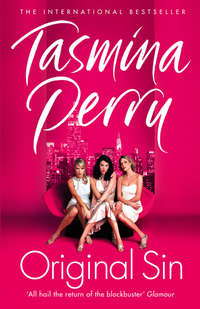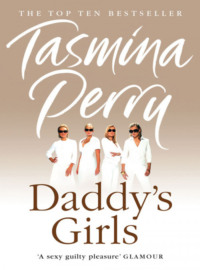
Полная версия
Guilty Pleasures
‘Oh, Emma, darling, handbags are the bedrock of the fashion industry. It’s where the most profit is made. They can account for 70, 80 per cent of a fashion company’s revenue. Do you think Louis Vuitton makes most of its money from ready-to-wear? They make it from Japanese girls spending half their salaries buying three handbags at a time. They make it from average Joe saving up for six months to afford a purse. Handbags are fashion’s golden goose.’
Cassandra looked at Emma’s clutch bag with barely concealed distain. ‘At least, sometimes.’
Emma bristled. She hated being bullied by Cassandra and her style knowledge; she’d always felt like a scarecrow in comparison.
‘We’re getting off the point.’
‘Which is?’ asked Cassandra.
‘I need a new designer.’
‘Yes. Poor Roger.’
Emma bit her tongue and refused to rise to the bait.
‘I wondered if you might be able to suggest someone?’
‘Why don’t you pencil in an appointment with my PA?’ Cassandra replied, looking a little bored.
‘Cassandra, I tried, but the soonest she could give me was in five weeks’ time!’
‘Well, I’m very busy as you can see. I’m off to Careyes next weekend. Have you ever been? You must. In the meantime, this is my party and I must go and attend to the guests. It’s been lovely to see you and maybe we can put in that lunch?’
Cassandra began to move away.
‘Please,’ said Emma more forcefully. ‘Even if you haven’t got time to help me, remember this is also your mother’s company.’
Clever bitch thought Cassandra. She exhaled heavily.
‘All right. Good accessories designers are hard to find,’ she said finally. ‘The best ones get poached to head up the womenswear of big houses like Frida Giannini at Gucci. The alternative is to recruit a big name stylist and team them with a technically competent designer.’
‘I want the biggest name we can get. Where do I begin?’
‘Unless you have personal contacts, which I suspect you do not, the big appointments are made through fashion and luxury head-hunters like Claude Lasner. He fixes up the right talent with the right company. Now I don’t wish to be impolite, Emma, but this is a working event. A very important night for me. I’m going to have to go.’ She looked down pointedly at the narrow gold watch on her wrist.
‘Can I tell Claude you told me to get in touch?’ asked Emma.
‘Of course. He’s a very dear friend. Now I really must go.’
As she turned, Cassandra walked straight into a body.
‘Do you mind if I join in?’ said a deep voice.
Jean-Paul Benoit handed Cassandra a glass of champagne and curled his fingers around her waist as he kissed her cheek. Cassandra pulled back from the strong scent of cologne.
‘Don’t worry, I was just leaving,’ said Emma.
‘And who was that?’ leered Jean-Paul, as he watched Emma’s behind disappear into the crowd. At the creative end, the world of fashion was largely homosexual. But the money men and the business brains were not. Jean-Paul had made it clear that he wanted sex with her. While sex, or the promise of sex, was a tool in Cassandra’s repertoire it was one that needed to be used with care.
‘That was my cousin needing advice on her little company,’ she said boastfully. ‘She fancies herself as the next Rose Marie Bravo.’
‘Really,’ replied Jean-Paul, looking after Emma with interest. ‘And what company would that be?’
‘Milford,’ she said quickly.
‘I didn’t realize that was in your family. A good heritage.’
She saw the interest on his face and felt a stab of panic.
‘A company in its death throes, I’m afraid.’
What was happening? This was supposed to be her perfect night, the pinnacle of her achievements so far and a springboard to the next stage, yet here she was, being ambushed by a mousy upstart, while the CEO of a major luxury goods conglomerate appeared to be interested in both Emma and the company. She felt like all her careful plans were coming unravelled.
Giles appeared and tapped Cassandra lightly on the arm.
‘What?’ snapped Cassandra, not trying to hide her annoyance.
‘Sorry to interrupt,’ he said, flashing a look of disapproval in Jean-Paul’s direction, ‘you’re wanted at the door.’
‘Excuse me, Jean-Paul. Duty calls,’ she said, with a winning smile. ‘Perhaps we can take this up again later on?’
She walked towards the entrance and through the sea of faces she could make out her brother Tom, arguing with a security guard. Their eyes locked through the crowd. She saw him mouth something to her but she turned her head away from him. All people wanted to do was take, take, take, she thought bitterly. What had anybody ever given to her? Without a backward glance, she turned to Giles.
‘Make sure security throw him out onto the street. Publicly.’
Giles opened his mouth to object before he saw the fury in her eyes. He turned towards the door.
As Cassandra moved back in to the party, she saw Emma leaving the cloakroom with her coat. She breathed a small sigh of relief when Jean-Paul passed her without any sign of recognition. The last thing she needed was a major luxury goods conglomerate interested in Milford. Now Cassandra knew what needed to be done. She could not allow Milford to get off the starting blocks. It had to fail so she could rescue it and gain control of it herself. But how to begin?
Then she smiled; the answer was right in front of her. This room was packed with fashion’s power players: executives, agents, photographers, art directors, stylists, PRs, journalists. All people Emma needed, people who needed to know that Milford was in the hands of an amateur who wore ballet pumps to the hottest party in Paris. People who needed to know that Milford was on the edge of bankruptcy. Fashion was a fickle world; it couldn’t stand to be associated with failure. And she knew exactly where to start: in the distance she could see Claude Lasner. It was only fair to warn him, she reasoned. She thought of her mother’s small shareholding in the company and shrugged the idea away. She had things to do. She had to make the night count.
8
‘It’s useless,’ said Emma throwing down another portfolio on the oak kitchen table. ‘This one only left St Martin’s six months ago. How can I appoint someone like that to be the head designer of Milford?’
‘It doesn’t mean to say they’re not any good,’ said Ruan McCormack, pouring out coffee from the stove in the warm kitchen of Winterfold. Emma had invited Ruan and Abby Ferguson around for some supper, hoping to sift through the pile of applications for the job of head designer. Claude Lasner had politely but firmly told her that he only dealt with the ‘top end of the market’, while a contact of Emma’s friend Cameron, who had been deputy design director at Gucci, had turned them down flat.
‘I don’t understand how you can call this good,’ said Emma, holding up a photograph from one applicant’s graduate show. ‘This model is wearing a straight-jacket! She looks like she’s escaped from an asylum!’
‘St Martin’s is very creative,’ said Abby, taking the photograph from Emma and looking at it as if she really understood it. She had only just left university herself; her father was a friend of Saul’s which is how she got the job but Emma was now beginning to doubt the wisdom of having invited her along at all. Although Emma liked her a great deal, her bubbly enthusiasm couldn’t disguise her inexperience. In fact, so far she had brought very little to the evening’s proceedings beyond throwing the odd lingering look in Ruan’s direction.
‘Look, this is serious,’ said Emma. ‘Obviously we’ve got to make the right appointment but I’ve got meetings with the banks next week and they are going to want to know who our management team are.’
‘What about going back to Roger?’ said Abby, trying to fill the silence.
‘I’m not sure that’s the best way forward,’ said Emma diplomatically, although she knew the choice was narrowing between Roger and Mr Straight-jacket.
‘How about I open a bottle of wine?’ said Ruan looking in his bag. ‘I swiped this from the boardroom.’
‘Great idea,’ smiled Abby, jumping up to fetch some glasses. ‘By the way, did you find out who wrote “Bailey Out” on the wall outside Byron House?’ she asked as she was rummaging in a cupboard.
Emma shook her head sadly. She was beginning to find running her own company less of a dream and more of a nightmare that she couldn’t wake up from. She understood why people in the factory and the village as a whole were nervous of change, but they hadn’t seen the Milford accounts. If Emma couldn’t find a way to reverse the company’s fortunes, the factory would close and they would all be out of jobs. And at the moment, she didn’t need the pressure of that responsibility to add to her worries.
‘I’ve spoken to Johnston, the floor manager,’ said Ruan briskly. ‘He says he will launch a discreet inquiry but doesn’t reckon any of his lot would do anything like that.’ His voice had a note of reproach that caught Emma unaware. Ruan had been supportive of her plan to modernize the products and the working practices, and she’d rather assumed that Ruan was on her side all the way. But his protective attitude towards the factory floor – people he’d worked alongside and probably grown up with – was only natural. Emma made a mental note: Must remember that this is life and death for some people.
‘It was probably some pissed kids from the pub,’ said Abby, trying to make light of it. Emma smiled at her, but she was unconvinced.
‘Perhaps,’ said Emma feeling her voice wobble. Abby caught the gesture and looked uncomfortable and embarrassed. She put the glasses on the table.
‘I’m just going through into the other room to phone my boyfriend,’ she said with mock cheeriness. ‘It’s 8 p.m. He’ll be wondering where I am.’
When they were alone, Ruan walked over and awkwardly put an arm around her. Emma had known Ruan McCormack almost all her life. Both his mother and father had been artisans at the factory. He had been a couple of years ahead of her at the local primary school, but at such a small village school, the kids all played together, plus Saul had allowed the children of Milford employees to swim in the lake at Winterfold, so Ruan had taught her to swim the front crawl and to dive. As they grew older they had drifted apart; just awkward smiles across the street when Ruan was with his friends. By the time Emma moved away to boarding school, Ruan had grown into a handsome young man; moody and super-cool; the hunk of the village. Whenever she came home in the holidays, if Emma saw him, she would blush furiously and run away.
She had hardly seen him in the last ten years but she had heard about his rise through the ranks of Milford to become head of merchandise. She knew he was well thought of and in the last two years he had been given a position on the board. He was still sexy, she thought with a smile. Dark wavy hair curled round the top of his white shirt. He had colouring that whispered of pirate ancestry; deep brown eyes, lightly-tanned skin and a strong mouth.
She dismissed the thought, feeling herself flush – she hoped it was the heat from the Aga. Today she was just grateful for his reassurance rather than his good looks. Ruan had been a tower of strength since the day she had arrived at Milford and he was about her only friend out here in the middle of nowhere.
‘Are you OK?’
‘I’m fine. It was just a bit of silly graffiti,’ she lied.
Ruan had uncorked a bottle of wine and handed her a glass.
‘I feel as if I’m stumbling around in the dark here,’ she smiled. ‘Tell me if you think we’re wasting our time.’
‘With the revamp?’
She nodded.
‘A revamp is exactly what Milford needs,’ said Ruan with such confidence it instantly buoyed Emma. ‘Our manufacturing is good. Our leather is even better than what they use at Connolly or Valextra. We just need a break.’
She leant into him just a fraction.
‘You could always cancel the meetings with the bank until we get a designer,’ said Ruan.
‘And prolong the agony?’ said Emma, shaking her head. ‘The longer the downward spiral continues the more difficult it’s going to be to climb out of it.’ She didn’t want to tell him the whole truth, that suppliers hadn’t been paid in three months, that unless something decisive was done, the company would be bankrupt within twelve months. Milford was Ruan’s life and home and there was little other work in the area beyond agriculture, which in any case wasn’t terribly healthy either after a series of environmental and political disasters. Theoretically, Ruan could find similar work elsewhere, but the reality was that Britain’s manufacturing industry was on its knees. Whatever you needed, it could be made cheaper and faster in the Third World. It would be even worse for Milford’s two hundred or so employees and Emma felt she had to protect them from such dire news until she was sure it was inevitable. But who could she share the burden with? She could hardly tell Roger – he probably hadn’t ever looked at the company accounts in twenty years – and besides, he would feel vindicated if the ship went down with Emma at the helm. ‘Oh, if I’d been in charge, I could have done something,’ he would tell his cronies. ‘But what hope did old Saul’s legacy have with some young floozy playing shop?’ Or her mother? She’d only care about Emma’s problems as they impacted on her, specifically her shareholding and any awkwardness it would cause at dinner parties. Her Aunt Julia? It was reasonable to assume she would believe that the company should have gone to her own daughter. No, the bottom line was that Emma was all alone in this and would have to face it by herself. She was grateful when she heard the doorbell chime.
‘Is that the food already?’ said Ruan. ‘They usually take hours.’
Along with Milford, Emma had inherited Morton, Saul’s septuagenarian butler whom she could ill afford to keep on but who was a Cordon Bleu standard chef. As it was his night off and as the only things in the fridge were duck and lamb shanks, (none of which were right for Emma’s single signature dish of spaghetti bolognaise,) she’d done the decent thing and ordered Chinese food from the village takeaway. ‘I’ll go and see.’
Emma had to yank hard on the brass doorknob to open the door and cold night air rushed in. There was an old man standing there, not a delivery boy. At first she didn’t recognize him as his face was lined and creased.
‘Uncle Christopher?’ she said flatteringly. ‘Is that you?’
Christopher Chase was not a real uncle, rather one of Saul’s oldest friends, often appearing at family gatherings and at Saul’s villa. He was also one of the country’s most famous sculptors; one of the few surviving members of the St Ives movement. As far as Emma could remember, he still lived in Cornwall, in fact she always thought of Uncle Chris in terms of the old nursery rhyme: ‘As I was going to St Ives/I met a man with seven wives …’. Christopher was on his fourth wife and had three children aged from 24 to 50.
‘It is indeed,’ said the old man, taking off his hat with a dramatic gesture. He was still a debonair man now. His face was wrinkled, but his eyes were still bright blue and twinkly, and he was wearing a rakish maroon cravat at his neck.
‘Gosh, well, you must come in,’ said Emma, moving aside. ‘It’s been a long time.’
‘Provence, I think, maybe fifteen years ago?’ smiled Christopher as he took off his coat. ‘As I remember, you told me off for not reading and you gave me a book. What was it? The one set in the South of France.’
‘Tender Is the Night.’
‘That was it!’ he exclaimed, snapping his fingers. ‘It was excellent.’
‘I was so pompous,’ laughed Emma, her earlier gloominess melting away. ‘Anyway, have a seat and I’ll nip through to the kitchen, I have some friends round for supper.’
‘Oh, I don’t want to intrude. I’ll only be a few minutes.’
‘No, it’s fine,’ she said waving her hand. ‘Let me go and tell them to entertain themselves for a while.’
By the time she returned Christopher had wandered into the library.
‘I see you’ve added a few feminine touches.’
She smiled. There hadn’t been a great deal of time to do anything with the house, but she had removed a few of Saul’s slightly more masculine decorations: the dented blunderbuss on the mantelpiece, the antique pistols, the buffalo skin Zulu shields, the rather severe-looking stuffed stag’s head which looked down from the eaves.
‘I tried to tell myself that poor stag had been dead for twenty years, but his eyes still seemed to be following me around, giving me evil looks,’ she smiled.
Christopher laughed. ‘I was there when Saul shot it. Perhaps I should have taken it myself and pickled it; I could have appealed to a whole new generation of art lovers.’
They both found themselves looking at the grand portrait of Saul above the fireplace. ‘I do miss that old rogue …’ said Christopher quietly. ‘I didn’t see him enough over the last few years. I regret that.’
‘We all do,’ said Emma.
Christopher nodded, then shivered, shaking his shoulders like a dog.
‘Anyway, sorry for dropping by unannounced. I was on my way to London and thought I’d take a detour into Chilcot. I’ve just been to the church to pay my respects to Saul. I couldn’t make the funeral; Chessie my wife was in hospital.’
‘Oh, I’m sorry. Nothing serious I hope?’
Christopher shook his head.
‘Everything’s fine.’
He wandered over to the mantelpiece and picked up a silver frame containing a black and white photograph of Saul and himself in Egypt, and another of them arm-in-arm at the top of Mount Cook.
‘Look at him,’ said Christopher with affection, ‘he always was a big showman.’
‘You noticed he has the biggest gravestone in the church grounds?’ smiled Emma.
‘Of course he has,’ laughed Christopher. ‘He should have been an entertainer, not a businessman. I know he wouldn’t mind me saying that. But he was shrewd enough to give the company to you. That news filtered down as far as St Ives.’
‘Shrewd? Not everybody sees it that way.’
Christopher looked at her, rubbing his chin with his hand. Emma was startled to see that his artistic fingers were now twisted and gnarled by arthritis.
‘I wanted to drop by and see if you were OK,’ he said with a note of concern. ‘How is it going so far?’
‘Difficult,’ she said honestly.
‘Roger?’
Emma caught the co-conspirator’s smile.
She grinned back and nodded.
‘Roger always had a high opinion of himself. Always been the failing of this company in my opinion. Saul allowed him to get away with far too much, indulged Roger’s ego. Actually, I think he was a little afraid of him. As I’m sure you know, Roger can be very charming, but he’s also very manipulative. Saul made him creative director at 25 because, well, because that’s what Roger wanted. And the company has been going downhill ever since.’
‘Well, he isn’t creative director of Milford any longer.’
‘You fired him?’ said Christopher, surprised.
‘Not exactly. Moved him along.’
‘Well, good for you,’ said Christopher. ‘But watch out for that one. You know what a rat will do when it’s cornered.’
Emma frowned. A rat? It was obvious Christopher didn’t think much of Saul’s younger brother, but that last comment was laced with venom.
‘Sorry, Emma,’ interrupted Christopher, glancing at the clock on the wall, then at his own wristwatch, ‘I really must be going. Chessie is at the Feathers. We’re staying there tonight and then we’re off to London.’
‘Oh. OK, if you must,’ said Emma, following him out of the library towards the door. ‘It’s always lovely to see you. How are the children, by the way?’
‘All fine. Well, I think they’re fine. I don’t see as much of them as I’d like. My two eldest live in Scotland. Stella, my youngest, lives in the States now. She’s a fashion designer. I tried to get her to follow in her old man’s footsteps – she studied sculpture at the Slade, but it seems she prefers working with cloth rather than clay.’
Emma’s ears had pricked up.
‘She’s a designer. Really? Who does she work for?’
‘Oh, some trendy American company in LA. Can’t even remember the name,’ he laughed.
‘LA?’
‘“La-la-land”, I know, but her mother lives on the West Coast. Stella went over there after college and never came back.’
‘Is she a good designer?’ asked Emma cautiously.
He laughed heartily. ‘How could she fail with my genes? Hey, maybe you should give her Roger’s old job? I’d be glad to have her back in the country.’
Emma smiled weakly. ‘Maybe it’s not such a crazy idea,’ she said under her breath.
‘Really?’ said Christopher, pulling a black leather diary from his inside pocket.
‘Then maybe you should give her a ring,’ he said, writing something down. ‘She doesn’t call me much, but the last time I heard she seemed to be quite happy out there – takes all sorts, I suppose. Here’s her number, anyway. You’ll get her answer machine, she’s never there. But if you leave a message she usually calls you back.’
Christopher hugged Emma then stepped back, holding her by the shoulders.
‘You stay strong, young lady,’ he said. ‘Saul gave you the company for a reason. Saul was many things, but he wasn’t a fool and he chose you to carry on his legacy – not any of those vultures in your family. I, for one, think he made a splendid choice and I know you’ll make him proud.’
He pulled down his hat and tipped a salute back inside the house, then he was away into the darkness and gone.
Emma stood there on the doorstep, feeling a distant wave of hope.
‘Who was that?’ asked Ruan, coming behind her with a glass of wine.
‘Milford’s lifeline,’ said Emma.
9
‘She is such a bitch!’ said Stella Chase indignantly. ‘Have you seen this shit?’ She thrust a copy of US Rive towards her friend Tash, stabbing a finger at the page. Moments earlier, the two girls had been sitting quietly in Venice Beach’s Fig-tree Café, eating frozen yoghurt and idly leafing through the latest fashion magazines. Then Stella had come across a twelve-page photo story on handbag designer Cate Glazer. Alongside a series of sumptuous photos of her palatial Hamptons home, the article gushed about Glazer’s life: how she had started as a bit-part soap actress, fallen in love with and married Hollywood producer Lance Glazer, then launched her must-have range of bags and purses. The cherry on the cake, said the article, was Glazer’s recent triumph, being crowned CFDA Accessories Designer of the Year.
‘Which bit are we referring to?’ asked Tash, taking a lick of double-berry yoghurt while she scanned the feature. ‘The photo of their new forty-million dollar home in Sag Harbor or the roll-call of her former boyfriends? There’s some pretty cute guys in that list, you know.’
‘This bit,’ said Stella, pointing at the page so hard her fingernail almost went through the paper. ‘That entire section boasting about the “Beverly” bag. How the design came to her in a dream. A dream!’
Stella jumped up, grabbed her things and barged out from the air-conditioned cool of the café into the bright heat of early spring afternoon in Los Angeles. She dumped the paper sack bulging with groceries she had bought from Whole Foods that morning into the basket of her bicycle as Tash tagged along behind her, the magazine fluttering in her hand.
‘Are you going to bring it up with her?’ asked her friend.
‘I won’t even be seeing her until Wednesday. You know it’s the Oscars tomorrow; she always takes the next two days off to recover.’
‘Cate loves to party,’ said Tash weakly.
Stella stopped dead on the boardwalk, causing a muscled in-line skater in only shorts and headphones to swerve dangerously to avoid her.






